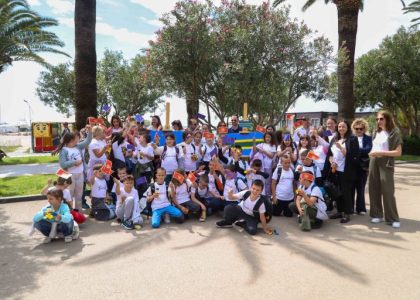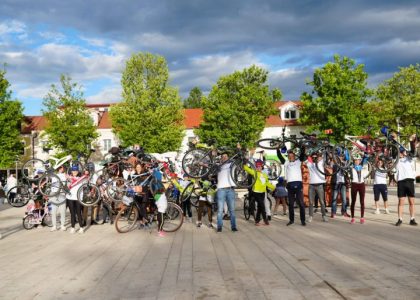“This project helped me a lot during the employment process. The experience I gained abroad and my personal activities, served as a signal to employers that I am someone who is ready to try something new, who is not afraid to develop his own ideas, instead of waiting to be given tasks, who solves problems rather than creating them. There is a certain amount of readiness and confidence that someone who has studied abroad develops from having an independent life, and many other things. You get the feeling that every problem can be solved.”
Admir Radoncic completed his fourth year of study in Maribor instead of Podgorica, and became part of a network of 4 million young people who have studied or will study, gain work experience or volunteer abroad, thanks to the Erasmus+ programme.
“This was a great opportunity to learn some new things, take courses and programmes that we could not attend anywhere else, alongside the core subjects that we are required to attend anyway”, says Admir.
Erasmus+ is a European Union programme for education, training, youth and sport for the period 2014–2020. The Erasmus+ programme was first implemented on 1 January 2014. It consolidated all the current European and international programmes and initiatives in the field of education, training, youth and sport, and replaced the seven existing programmes: the Programme for Continuous Learning, “Youth in Action” and international cooperation programmes (Erasmus Mundus, Tempus, Alfa and Edulink).
Formal education is something that Admir expected to gain in Maribor, but he returned with much more than that.
“It was an opportunity to travel and to learn Korean and Chinese, to try skiing or skating. I had time for everything, not just studying, going out and socialize. But, the most I like are the possibilities that are provided and it is on you to decide whether you want to use them or not”.
![]()
Ksenija Martinovic has a similar experience, thanks to the Erasmus + she went to Rome.
“Exchanges assist you in every aspect of personal, academic and professional life. In the beginning, the exchanges look like a way to meet different cultures, meet different people, hang out and travel, but soon after, you realise that it brings much more, and you become more competitive in the labour market. In my case, the competence that I acquired during the exchange enabled me to successfully lead a student organisation, join an international student organisation and get my first job during my studies”, says Ksenija.
Both Admir and Ksenija are encouraging young people to sign up, especially since the process is not demanding.
“The process of application involves writing a cover letter, collecting the relevant local recommendations from professors, having appropriate evidence of knowledge of English, if that is required. I didn’t need it in Maribor, what I had learned at university was enough”, explains Admir.
Admir now works in a non-governmental organisation dealing with youth problems and which helps young people do volunteer work in EU countries. He is doing what he loves, and Erasmus is responsible for this too, among other things.
“This project helped me a lot during the employment process. The experience I gained abroad and my personal activities, served as a signal to employers that I am someone who is ready to try something new, who is not afraid to develop his own ideas, instead of waiting to be given tasks, who solves problems rather than creating them. There is a certain amount of readiness and confidence that someone who has studied abroad develops from having an independent life, and many other things. You get the feeling that every problem can be solved”, concludes Admir.
The European Union has allocated €14.7 billion for Erasmus+. All EU countries are included, and you can fill in an application at http://ec.europa.eu/programmes/erasmus-plus/documents/erasmus-plus-programme-guide_hr.pdf. Just have patience when waiting for an answer, because all expenses, including the tickets there and back are paid for.
For more information, see http://ec.europa.eu/programmes/erasmus-plus/index_en.htm.
On this site you can select the organisation from the EU for which you would like to volunteer: https://europa.eu/youth/volunteering/evs-organisation_en.


